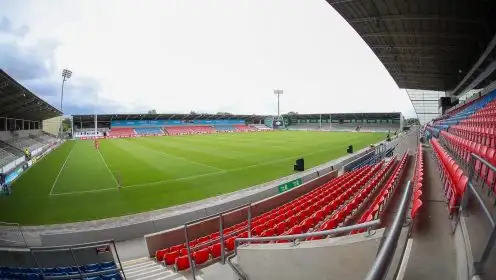Super League shuns weekend: Does schedule need to change?

Super League was absent from the sporting schedule last weekend with the whole of round three done and dusted by 10pm on Friday night.
With some clubs acknowledging that they have an ageing fanbase, the gradual move away from Saturday and Sunday games might be a contributing factor as to why some are struggling to get more youngsters through the turnstiles.
When the competition started in 1996, a total of 71% of the games were played on Saturday and Sundays. That was down to 45% in 2022, and in 2023, looks set to decrease even further – with just 27% of the games up until the end of May to take place on the weekend.
Almost half of the Saturday games in 2022 were Catalans and Toulouse home games.
What days are Super League games played on?
| Thu | Fri | Sat | Sun | Weekend % | |
| 1996 | 1% | 19% | 19% | 52% | 71% |
| 2005 | 1% | 38% | 14% | 43% | 57% |
| 2006 | 1% | 42% | 25% | 27% | 52% |
| 2013 | 2% | 34% | 20% | 36% | 56% |
| 2014 | 13% | 34% | 15% | 33% | 48% |
| 2016 | 15% | 42% | 14% | 23% | 37% |
| 2019 | 15% | 39% | 17% | 26% | 43% |
| 2022 | 15% | 31% | 24% | 21% | 45% |
| 2023 | 17% | 41% | 14% | 13% | 27% |
*2023 figures based on games up until end of May and broadcasting schedule
**Magic Weekend has dictated at least 4% of games played on weekends since 2007
***Years picked as 2005 was last season before Catalans (who have regularly played at home on Saturdays) joined, then 2006 as their first year and also 10 years on from 1996. 2013 as final year before Thursday night TV game, 2014 as first year of Thursday night TV game. 2016 as 20 years on from 1996. 2019 as last full season pre-COVID.
****The other common day of games played is Monday, majority of which are over Easter weekend. The most games on a Monday was in 2013 (9%), when TV games were shown then in the summer.
Is the Thursday night TV game to blame?
In the early years, the TV games were shown on Friday and Saturday nights. But the introduction of the Thursday night TV game in 2014, replacing the previous slot held by live Championship rugby league, caused disruption.
Now faced with a short-turnaround if they played the previous Sunday, clubs started to bring their games forward to avoid that disadvantage. Then clubs started moving games if their previous opponents had played on the Thursday before too, to avoid such a significant disparity in rest time between games.
That routine crept in to Friday night matches too, and it seems to have got to a point now where clubs have simply moved their regular home game slots from Sunday to Fridays regardless if they were on TV or not, to try and create at least some consistency for fans, and to minimise the number of changes.
As an example, Castleford had to bring forward their game against Wigan last weekend from their regular Sunday slot to Friday due to the Warriors being on Sky Sports this Thursday against Catalans.
But is that good for the game and attracting match-going supporters?
Clearly, Thursday and Friday nights are good for TV viewing. Not so good for fans trying to get to grounds from work and beating the traffic.
In the last season before the Thursday night TV game was introduced, 56% of games were on Saturday or Sunday. That dropped to 48% in 2014 and by 2016 it was 37%. It is worth noting too that a significant percentage of the Saturday games (more than half in 2016 and 13 out of 29 in 2019) were Catalans home games.
Catalans’ crowd figures, in my opinion, benefit from their consistent time slot of Saturday nights at 6pm. That’s evidenced by the fact that their game against Hull FC last Friday, kicking off at 7pm local time, attracted a crowd below 7,000, considerably lower than their average upwards of 8,000 since they joined Super League.
Creating habits and consistency with the Super League weekend schedule
Non-league football is enjoying a rapid growth, and that has to be partly down to the fact that kick-off times are consistently Saturdays at 3pm. It creates habit and convenience.
You would imagine if there was a new TV deal that dictated more games on Saturday and Sunday, that they would be played then. So that goes against the theory of turnaround times and ‘corporate’ sales dictating clubs play on a Friday night. It’s worth noting too that football is not allowed to be televised between 2.45pm and 5.15pm on a Saturday due to the UEFA blackout rule, and Premiership rugby union is often televised at this time.
Despite its riches, Premier League football still plays more than 80% of its games at weekends and 55% on a Saturday.
Another negative factor of the current Super League schedule is that the broadcasted Friday game is going up against several others.
Friday night’s thriller between St Helens and Leeds was played when four other matches were on, thus reducing the attention on it and of course the potential number of viewers.
The TV games, typically the biggest ones of the weekend, should be stand alone and have the greatest opportunity for maximum attention.
RECAP: Five takeaways from Friday night’s Super League action



